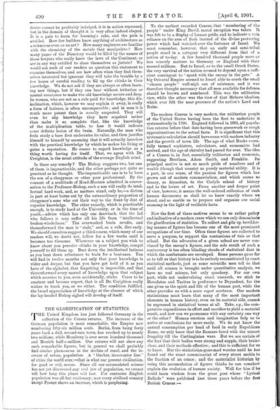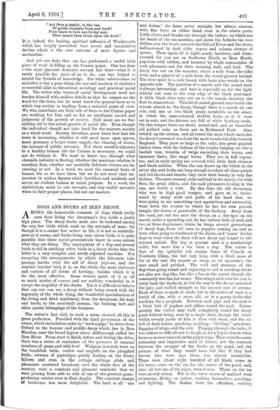THE GLORIFICATION OF STATISTICS.
THE United Kingdom has just followed Germany in the collection of the Census returns. The increase of the German population is most remarkable, the Empire now numbering fifty-six million souls. Berlin, from being forty years back a dull, second-rate town, has reached up to nearly two millions, while Hamburg is over seven hundred thousand and Munich half-a-million. Our returns will not show any such remarkable figures, but in general we shall probably find similar phenomena in the decline of rural, and the in- crease of urban, population. A "blacker, incessanter line" of cities the world over,—that is what our present civilisation, for good or evil, means. Since all our accumulated science has not yet discovered any real law of population, we cannot tell how long this phase will last. For centuries English population was all but stationary; now every civilised country except Franee kows an increase, which is perplexing. To the earliest recorded Census, that numbering of the people" under King David, moral exception was taken. It was felt to be a display of human pride, and to indicate a vain reliance on the arm of flesh instead of the divine protecting power which bad watched over the fortunes of Israel. We must remember, however, that an early and semi-tribal people stood in a category very different from that of a nation of to-day. A few hundred thousand people more or less scarcely matters to Germany or England with their massed millions. But to Israel, as to the small Greek States, the very survival of the nation seemed to depend upon a suffi- cient contingent to speak with the enemy in the gate." -A big Oriental Empire seemed to Israel able to crush the small " chosen people" well-nigh out of existence, and it was therefore thought necessary that all men available for defence should be known and numbered. This was the utilitarian view, while the other • was the view of that Hebrew idealism which ever felt the near presence of the nation's Lord and Ruler.
The modern Census is very modern, the utilitarian people of the United States having been the first to undertake it systematically in 1790. England followed in 1801, all popula- tion returns before that date having been guesswork or rough approximations to the actual facts. It is significant that this systematic calculation should have come with modern industry and the growth of town life The age of what Burke scorn- fully termed sophisters, calculators, and economists had arrived, and the age of chivalry had passed for ever. The idea of a Census is, in fact, essentially utilitarian and economic, suggesting Bentham, Adam Smith, and Franklin. Its principal motive is not so much pride of numbers and of wealth (though that counts) as purely material utility. It is a part, in one sense, of the passion for figures which has grown out of modern commercialism, and which seems so dreary, so dryasdust, to the Carlyle school of history and to the lovers of art. From another and deeper point of view, however, it means the well-ordered collection of such human documents as shall let us know exactly where we stand, and so enable us to prepare and organise our social economy in the light of verifiable facts.
Now the first of these motives seems to us rather paltry and indicative of a modern craze which we can only denominate the glorification of statistics. To collect and pile up bewilder- ing masses of figures has become one of the most prominent occupations of our time. Often these figures are collected to serve a purpose, to support the contentions of this or that school. But the advocates of a given school are never con- vinced by the enemy's figures, and the sole result of such a controversy is too often blinding clouds of statistical dust in which the combatants are enveloped. Some persons go so far as to tell us that history is to be entirely reconstituted by exact statistical methods, just as some scientific men tell us that until all science is brought under quantitative analysis, we have no real science, but only quackery. For our own part, while not undervaluing exact research, we stick to Herodotus and Tacitus in preference to Dryasdust, for the 9ne gives us the spirit and life of the human past, while the other provides us with a mere eaput mortuum. Our modern statisticians must learn that many of the most important elements in human history, even on its material side, cannot be expressed in statistical terms at all. Take, e.g., the com- parative expenditures in effort and sacrifice to yield a material result, and how can we pronounce with any certainty one way or the other? Human emotion and imagination help us to arrive at conclusions far more easily. We do not know the annual consumption per head of food in early Republican Rome, we only know that the Romans fared with the utmost frugality till the Carthaginian wars. But we are certain of the fact that their bodies were strong and supple, their brains clear, and their methods effective ; and this is suf6.cient for us to know. But the statistician-gone-mad worries until he has found out the exact commissariat of every street urchin to the fraction of an ounce; and the materialist historian by using this accumulation of figures thinks he can somehow explain the evolution of hunian society. Well for him if be could learn wisdom from the great poet whose "Lyrical Ballads" were published 'just three years before the first British Census:—
"Art thou a statist, in the van Of public business born and bred ? First learn to love one living man, Then mayst thou think upon the dead."
It is, indeed, the healing, spiritual influence of Wordsworth which has largely prevented that moral and imaginative decline which is the sure outcome of mere figures and Mechanism.
And yet one feels that one has performed a useful little piece of work in filling up the Census paper. One has done —the most ignorant domestic servant has done—what it is rarely possible for most of us to do ; one has helped to extend the bounds of knowledge. For while subservience to statistics is but a poor thing, the use and mastery of statistics is essential alike to theoretical sociology and practical social life. The writer who treats of social development need not burden himself with endless details so that he cannot see the wood for the trees, but he must know the general facts as to which way society is tending from a material point of view. We who contribute our little tale of facts to the Census paper are working for him, and so for an intelligent record and judgment of the growth of society. Still more are we fur- nishing aid to the actual growth of social life. Even though the individual should not take heed for the morrow, society as a whole must. Society, therefore, must know how fast the town is increasing, whether it will need more open spaces, more greenery, a larger water supply, the clearing of slums, the increase of public servants. For these needful adjuncts to a healthy human life the Census is necessary; we could not do without it. We want to know, too, through what channels industry is flowing, whether the marriage relation is standing firm, whether our mentally deficient victims are in- creasing or not. In a word, we need the essential facts of human life as we have them, but we do not need that im- inersion in useless figures which bewilders and misleads and serves no evident human or social purpose. In a word, the statisticians must be our servants, and very useful servants when in their proper places, but not our masters.







































 Previous page
Previous page